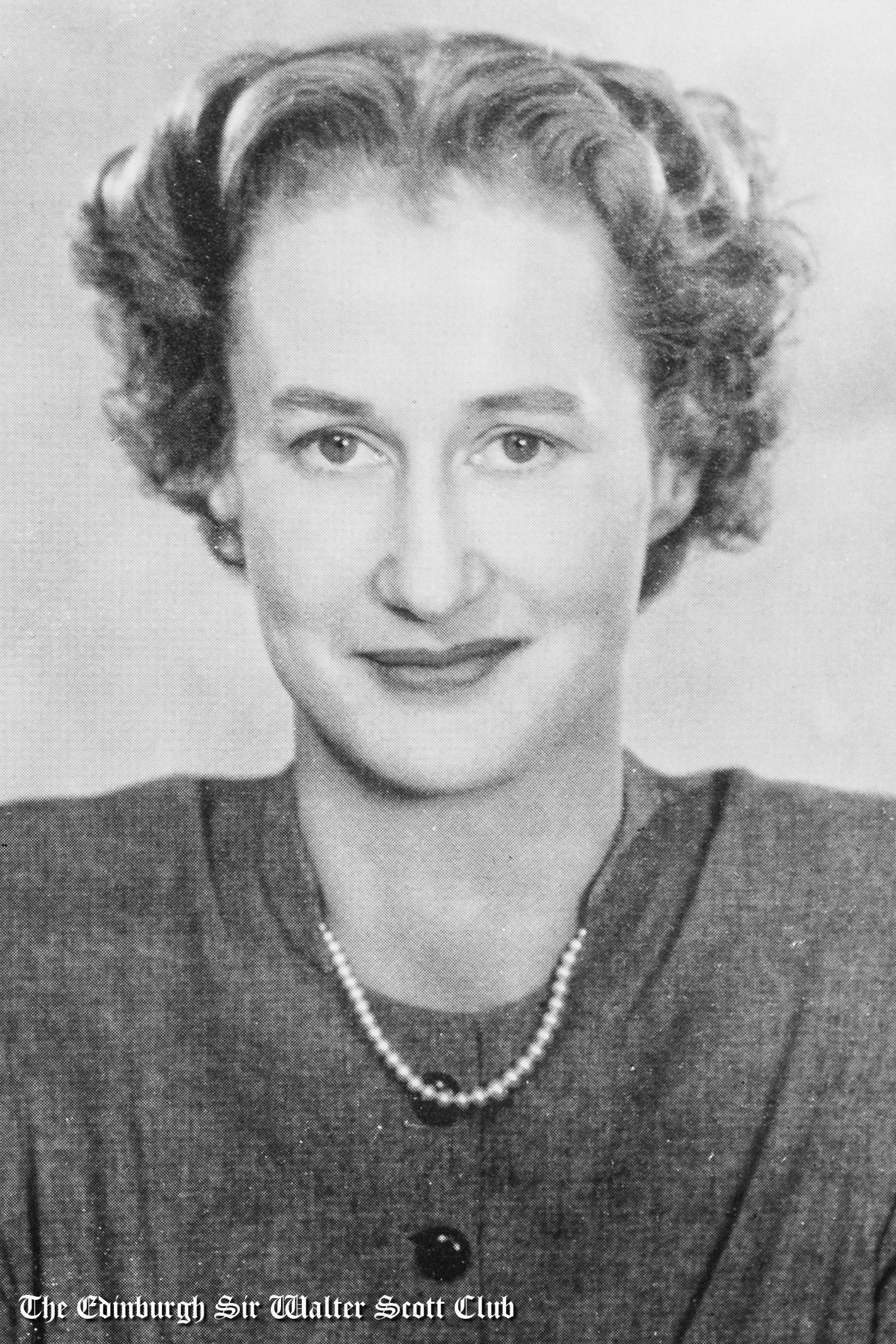1954
Our President in 1954/55 was:
The Right Hon. Lady Tweedsmuir
She proposed the Toast to Sir Walter at our 47th Annual Dinner on Friday 18th February 1955 in The North British Station Hotel
Download the [transcript] or read the [bulletin]
Summary of the Speech:
Lady Tweedsmuir’s address was notable not only because she was the first woman to serve as President of the Edinburgh Sir Walter Scott Club, but because she brought a fresh, intuitive and personal lens to her discussion of Scott—balancing admiration with candid critique.
Key Themes and Highlights:
1. Scott as a National Unifier and Symbol of Renaissance:
- Scott played a vital role in rekindling Scottish national pride after centuries of religious and political conflict.
- He bridged Highland and Lowland divisions and helped heal the wounds left by the Covenanting and Stuart wars.
- Lady Tweedsmuir viewed him as central to Scotland's second Renaissance, fostering an all-Scottish patriotism.
2. Scott’s Personality and Moderation:
- She characterises Scott as a “Moderate Man”—not mediocre, but tolerant, balanced, and generous in spirit.
- His practical life—clerk, sheriff, advocate, laird—made him grounded and worldly, not just a literary figure.
- She praises his deep social compassion, evident in his support for pensioners even during financial ruin.
3. Financial Recklessness and Moral Fortitude:
- Lady Tweedsmuir argues that Scott lacked financial common sense—citing Abbotsford and his dealings with Constable and Ballantyne—but excelled in personal courage and responsibility.
- His response to bankruptcy was not shame but productivity: he continued writing to repay debts, showing character over circumstance.
4. Abbotsford and Domestic Insight:
- Tweedsmuir offers a frank, somewhat humorous critique of Abbotsford—admiring its setting, but finding its décor dark and cluttered.
- She highlights Lady Scott’s limited influence in furnishing the home, subtly reflecting on women’s constrained roles.
5. Scott’s Works – Mixed but Enduring:
- She appreciates the Journal above all for its personal insight, describing it as “great writing” and “sad, moving, and direct.”
- Scott’s novels are inconsistent—often poorly constructed or padded—but still powerful. Guy Mannering, for example, has flawed structure but unforgettable characters like Dandy Dinmont and Meg Merrilees.
- She finds Scott's female characters generally lacking in emotional depth, attributing this to his distance from romantic intimacy in real life.
6. On Genius and Work Ethic:
- Lady Tweedsmuir suggests Scott’s greatness lies in his intense discipline and emotional depth under pressure.
- She questions whether his later novels (written post-ruin) are his best, but argues adversity often awakened his genius.
- She echoes Aristotle in asserting that genius arises from an “agitated soul,” and praises Scott's capacity to endure and create under hardship.
7. Legacy and Relevance:
- Scott’s strength lay in portraying the worth and dignity of the ordinary person.
- His influence transcended literature—encouraging a classless Scottish kinship and historical perspective.
- Tweedsmuir argues that to revive interest in Scott, we must start with “the man and his age” rather than plunge readers straight into the novels.
Noteworthy Observations:
- A moving passage is quoted from Scott’s Journal regarding his heartbreak over potentially losing Abbotsford: “There is scarce a tree upon it that does not owe its being to me…”
- She challenges modern impatience with long prose and moralising, reminding us that Scott wrote in a world that valued religious and rhetorical weight.
Interesting Points to Highlight:
- First female President of the Club and aware of the symbolic weight of her role.
- She disagrees with her father-in-law, John Buchan, on Scott’s “commonsense,” marking a rare public literary debate within a family of influence.
- Her view that Scott’s greatness lay not just in his talent but in his moral courage and human understanding gives the address lasting resonance.
- Emphasises that Scott “gave his best parts to the humblest people,” embodying democratic ideals before they were fashionable.
Download the [transcript] or read the [bulletin]

Subsidiary Toasts
The toasts of “The Queen” and “The Royal Family” were duly honoured.
Thereafter Mr H. R. Leslie, Q.C., proposed the toast of “The Imperial Forces,” to which Air Vice-Marshal R. L. Ragg, C.B., C.B.E., A.F.C., R.A.F., replied.
“The City of Edinburgh” was proposed by the Rev. H. C. Whitley, M.A., Ph.D.; and replied to by Bailie Greig Dunbar.
The health of the Chairman was proposed by Dr Arthur Melville Clark.


